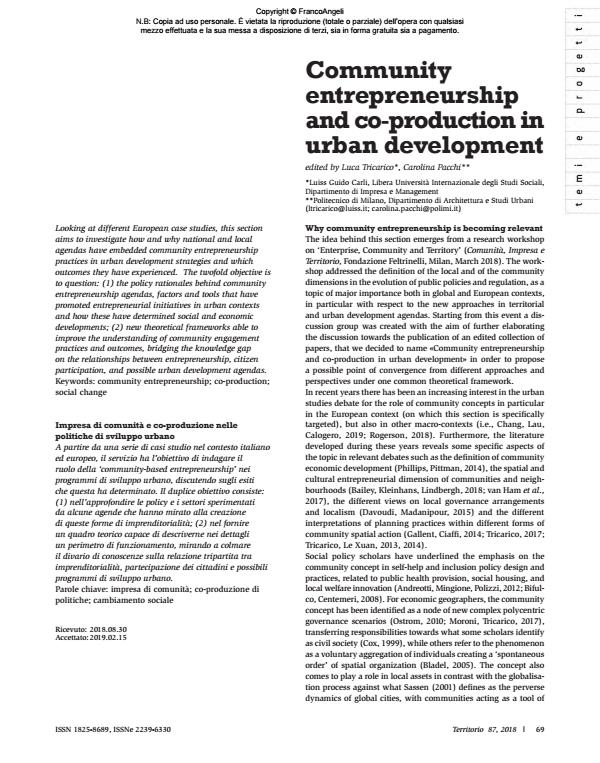Community entrepreneurship and co-production in urban development
Journal title TERRITORIO
Author/s Luca Tricarico, Carolina Pacchi
Publishing Year 2019 Issue 2018/87
Language English Pages 9 P. 69-77 File size 157 KB
DOI 10.3280/TR2018-087011
DOI is like a bar code for intellectual property: to have more infomation
click here
Below, you can see the article first page
If you want to buy this article in PDF format, you can do it, following the instructions to buy download credits

FrancoAngeli is member of Publishers International Linking Association, Inc (PILA), a not-for-profit association which run the CrossRef service enabling links to and from online scholarly content.
Looking at different European case studies, this section aims to investigate how and why national and local agendas have embedded community entrepreneurship practices in urban development strategies and which outcomes they have experienced. The twofold objective is to question: (1) the policy rationales behind community entrepreneurship agendas, factors and tools that have promoted entrepreneurial initiatives in urban contexts and how these have determined social and economic developments; (2) new theoretical frameworks able to improve the understanding of community engagement practices and outcomes, bridging the knowledge gap on the relationships between entrepreneurship, citizen participation, and possible urban development agendas.
Keywords: Community entrepreneurship; co-production; social change
- Rivitalizzazione di edifici pubblici e condizioni di contesto. Riflessioni a partire dal caso italiano Beatrice Maria Bellè, in TERRITORIO 105/2024 pp.106
DOI: 10.3280/TR2023-105014 - Towards new geographies of cohesion in a context of growing inequalities: insights from two social innovation projects in Milan metropolitan area Luca Lazzarini, Carolina Pacchi, in Urban Research & Practice /2024 pp.631
DOI: 10.1080/17535069.2023.2286231
Luca Tricarico, Carolina Pacchi, Community entrepreneurship and co-production in urban development in "TERRITORIO" 87/2018, pp 69-77, DOI: 10.3280/TR2018-087011